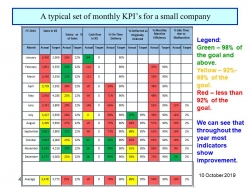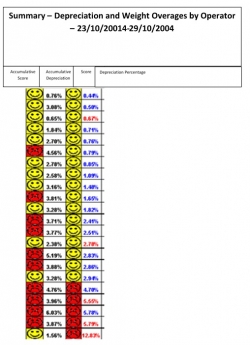A separation won’t stop a couple from thinking about each other. In the same way, termination of employment doesn't stop employers and fired employees from talking about one another. Managers and employees continue to mention previous employees’ names, and dismissed individuals continue to talk about their former place of work.
Employees who were happy at their job and left under their own initiative, to study or to advance their career, will say good things about the company. But employees who were fired or left the company with bad feelings, will slander the company anywhere they can. They will speak ill of the company, not only to their old colleagues, but to other people in their immediate environment, the same environment in which you will try to recruit new workforce in the future.
I know of companies who were forced to look for new recruits outside their area, because candidates refused to work for them, following bad reputation spread by disappointed employees.
Termination and instability
Generations Y and Z regard stability at work as less important as they do other values. Many young people, post Covid era, prefer to work freelance and not for an employer. This causes difficulties for employers to retain employees and find new recruits.
The Hi-Tech industry has also been experiencing this new employees’ preference. However, due to the global on-going economic recession, Hi-Tech companies have been required to downsize their workforce and fire employees. So, we are faced with two opposing developments. On the one hand, employees seek mobility, a trend which makes it difficult for companies to retain and recruit manpower. On the other hand, the Hi-Tech industry finds it necessary to lay off employees.
An article, published in TheMarker magazine about six weeks ago, quoted The Economist’s following account:
- Meta (formerly Facebook) will cutback more than 11,000 jobs: 13% of their work force.
- HP declared a layoff of 6,000 employees, around 10% of its employees.
- Amazon announced that staff reduction will continue this year.
- Stripe (an online payments processing platform) has revealed that 14% of its employees will be sent home.
- Snap Inc. and Shopify published their intention to reduce their workforce next summer.
Announcements of cutbacks, especially when made by leading technological companies, have an impact on other companies, investment fund, etc.
Companies who are compelled to terminate employees will recruit again when the recession is over. Some small companies may close, but founders will, most likely, establish new projects and require new employees.
How terminations impact the remaining team members
Many employees maintain friendly relations with former team members. Their termination always causes the remaining employees to fear they might be next. Especially at times of cutbacks.
A study at the University of Wisconsin-Madison, performed in 2008, found that, on average, a 1% decrease of the workforce leads to 31% of voluntary resignation. The study shows that team members who are concerned they might be dismissed, prefer to take initiative, and look for alternative employment beforehand. That means more disruption to the company’s headcount and higher expenses on recruitments.
How to act?
Remaining employees examine the way the company executes terminations and how it treats terminated employees. Remember that relations with fired employees do not end upon termination of employment and you may wish to employ these people again in the future.
Recommended steps:
- Management must make sure that all employees believe that actions were taken in good faith, no discrimination was applied when selecting the termination list, and the terminated employees were treated with respect.
- Treat terminated employees respectfully, even if caught stealing. Keep the wrongdoing confidential and avoid shaming.
- Do not regard fired employees as enemies of the company.
- Providing professional help to terminated employees will be greatly valued by the remaining team members.
- If possible, assure the employees that no more layoffs are planned. This will enhance their job security and reduce the number of voluntary resignations.
Should terminated employees work after notice?
Terminated employees are bitter even when treated with respect. They are angry. They might become a toxic factor to the remaining employees, try to collect information for the benefit of their next employer or harm the company in other ways.
For example: a company I managed had to fire a good employee due to cutbacks.
The employee asked to continue working through his notice period. I was concerned, but because he had been a positive and loyal individual, management decided to let him work until the last day of his notice. I agreed on the condition that all companies’ database and information would be backed-up.
The day the employee received his notice he deleted the company’s database and disappeared. Lucky it had all been backed-up.
My categorical recommendation is therefore, to treat terminated employees with the utmost respect, but not to allow them to work after their notice day.
When to reconsider the termination list?
- Do not fire veteran employees only because they are less productive. Find them an alternative, more suitable role. Terminating aging employees sends a message that more team members’ days are numbered, and people should look for other jobs while they still can.
- Before dismissing employees who don’t meet their objectives, make sure they know and understand their goals, the targets are defined in writing and periodically assessed. If the employee had been asked to prepare an improvement plan but did not meet it, there is room for termination. Otherwise, make sure employees know their objectives and are striving to meet them.
Summary and recommendations
Terminating employees is an unpleasant task, though it happens all the time. Do not keep unsuitable employees because the termination process is unpleasant.
When planning termination, be fair, thoughtful, and respectful.
Think of remaining employees and how they perceive the terminations process. Don’t drive them to look for other jobs before they had been given notice.
When you are forced to reduce your workforce by terminating one or more employees, try to provide professional help.
Do not treat terminated employees as enemies, but do not allow them to work after their notice day.
Respect all employees, including those who had been caught stealing. Do your best to maintain their dignity.
Fear of termination, at times of cut-backs, may cause good employees to leave the company. If possible, assure the workforce that the company is not planning further terminations in the future.
Finally, always think of the day you will be recruiting again. You may wish to rehire former employees, their friends, or acquaintances.












 My First Book: Manage! Best Value Practices for Effective Management
My First Book: Manage! Best Value Practices for Effective Management